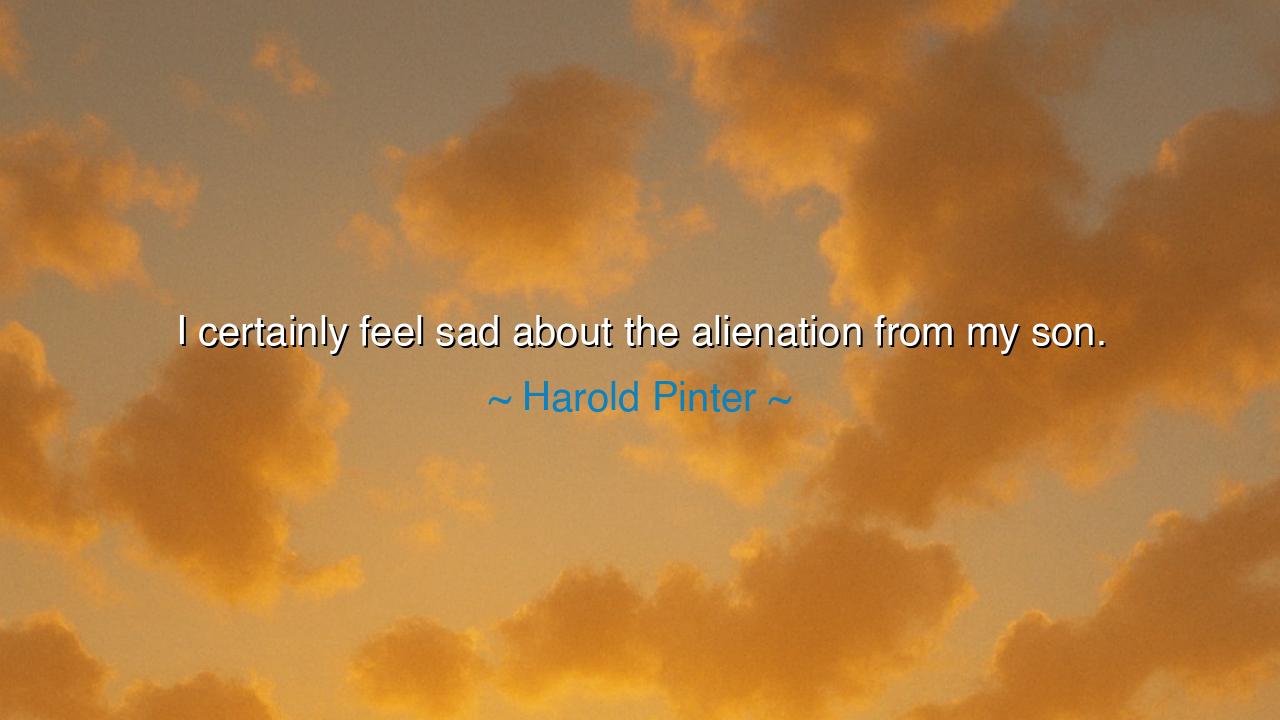
I certainly feel sad about the alienation from my son.






Hear the lament of Harold Pinter, master of words and silences, who confessed with pain: “I certainly feel sad about the alienation from my son.” This is not the voice of the playwright alone, but of a father speaking from the deepest wound of human experience—the rift between parent and child. In these few words lies the anguish of disconnection, the ache of love unfulfilled, and the eternal struggle between blood and distance.
The heart of this saying lies in the nature of alienation. To be alienated is not merely to be apart in space, but to be estranged in spirit. Between a father and son, the bond is meant to be unbreakable, woven of lineage, memory, and shared humanity. Yet life, with its trials, quarrels, or silences, can sever even this sacred thread. Pinter admits this sorrow without embellishment: the sadness is not abstract, but visceral, born of love that longs yet cannot bridge the divide.
History gives us countless mirrors of this pain. Think of King Lear, who, blinded by pride, alienated himself from his truest daughter, Cordelia. His kingdom fell, and his soul was shattered, because he failed to nurture the bond that mattered most. Or recall Absalom, the rebellious son of King David, whose estrangement ended in rebellion and death. David’s cry—“O Absalom, my son, my son!”—is the same cry that echoes in Pinter’s words: grief for love that was lost not through death alone, but through distance of the heart.
The origin of Pinter’s quote lies in his own life, for he endured strained relationships within his family. Yet his personal sorrow carries a universal weight. Every parent who feels estrangement, every child who drifts away, knows the haunting ache of love unreturned. His confession is a reminder that no brilliance in art, no honor in achievement, can shield a soul from the ordinary heartbreaks of human life. Even the greatest of writers still kneels before the grief of family estrangement.
Yet within this sadness lies a lesson for all who hear. It teaches that relationships cannot be left untended, that silence, pride, or neglect can build walls higher than any fortress. To preserve the bond of parent and child—or of any beloved—we must act with humility, forgiveness, and persistence. For time is relentless, and the day may come when reconciliation is no longer possible.
The lesson then, children of tomorrow, is this: do not wait until alienation becomes regret. If a rift exists between you and one you love, seek to mend it now. Even if words are imperfect, even if the gesture is small, attempt it. For a bond restored, however fragile, is worth infinitely more than a lifetime of silent sorrow.
Practical wisdom calls to us: speak when the heart urges; forgive when pride resists; reach out even when you fear rejection. To parents, remember that children are not possessions but souls entrusted to you. To children, remember that parents are not eternal but fragile beings whose time is limited. Let love be spoken before silence becomes the only voice.
Thus, Harold Pinter’s words endure not only as confession but as warning. “I certainly feel sad about the alienation from my son.” May we hear in this sorrow the call to guard against estrangement, to honor our bonds while they remain, and to walk the path of reconciliation before it is too late. For in love restored lies the noblest triumph of the human heart.






AAdministratorAdministrator
Welcome, honored guests. Please leave a comment, we will respond soon